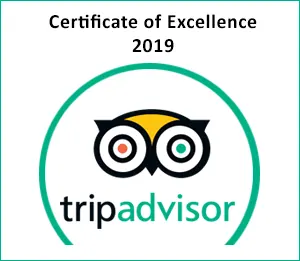Day 1: Arrive in Bangkok.
The Best Tour of Thailand
This is a Private Guided Vacation - You are the Only Guests
Start on Your Preferred Date, Subject to Availability
Upscale Lodging Shown, Upgrades Available to Luxury & OpulentArrival Details. Your arrival and departure transfers can be reserved with your guest relations manager, who is assigned to you after you book your tour. You are greeted as you exit the customs area at Bangkok airport and then you are driven to your charming upscale hotel on the River of Kings. You are assisted with your check in and you are at leisure for the late afternoon. Chatrium Hotel Riverside Bangkok has views of the Chao Phraya River and the vibrant cityscape. This riverside hotel combines elegance with modern comfort, and your large balcony room has a wonderful view of the river and the city. The hotel's prime location positions it conveniently near some of Bangkok's most iconic attractions.
About Bangkok The giant metropolis of Bangkok is a fascinating blend of modern skyscrapers, congested traffic, beautiful and ornate Wats (temples), incredible street food, and a lot more. The colorful Thai culture and the easygoing local lifestyle make this unique city even more interesting.
(Overnight – Chatrium Riverside Bangkok)
Day 2: Bangkok. (Breakfast) Ayutthaya Excursion
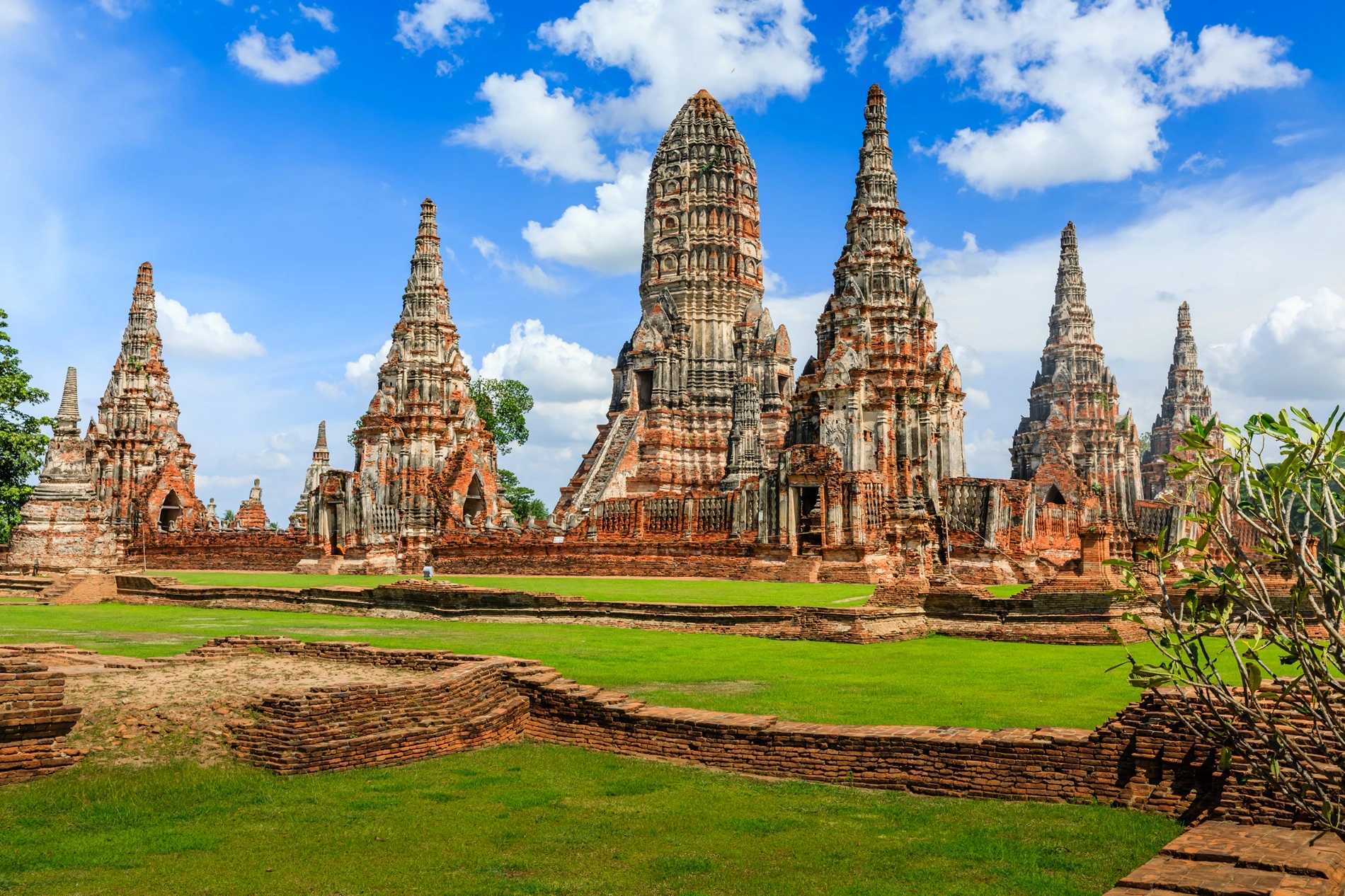
Ayutthaya
Ayutthaya. A 1.5 hour drive each way bring you to Ayutthaya, the last capital of the kingdom of Siam. Ayutthaya is home to the crown jewels of Thailand’s historical monuments, architecturally interesting structures that showcase Thailand’s glorious past. As there is a plethora of such structures dotting the area, you will visit the most impressive monuments, and this visit will enhance your appreciation of the unique Thai culture and its roots in Buddhism.
The Siam Kingdom. Before being sacked by the Burmese army in the late 18th century, Ayutthaya was a thriving city, one of the most important capitals in all of South East Asia. During its golden age, Ayutthaya had strong diplomatic and commercial relationships with existing world powers such as Japan, Portugal and France.
Royal Palace. Start your exploration of the area with a visit to the site of the Royal Palace, which served as home to 33 kings of Siam between 1350 and 1767 A.D. The three large bell shaped chedis of Wat Phra Si Sanphet (the Royal Chapel), which were constructed in the 14th century, stand proud and tall even today, and are perfect examples of Ayutthaya style architecture. There is a break for lunch before you continue your exploration.
Royal Monastery. You will now drive a very short distance to the site of the royal monastery, known as Wat Mahathat. This surreal spot is replete with ancient Buddha statues that range from being in excellent condition, to some that have deteriorated significantly. The statues are spread throughout the towering Khmer-style ruins, and this site also boasts the much-photographed stone carving with the Buddha’s head partially wrapped up by the roots of an ancient banyan tree.
Reclining Buddha. The next stop is Wat Lokayasutharam, the site of Ayutthaya’s largest Reclining Buddha statue, at over 100 feet (31 meters) long and 25 feet (8 meters) high. The last stop, and perhaps the most magical and photogenic in Ayutthaya, is the 17th century Wat Chaiwatthanaram. With its Khmer-style tower and surrounding prangs, it bears a resemblance to Angkor Wat, and may have been built to commemorate the king’s victory over Cambodia.
At the end of your exploration of Siam’s antiquities, you are driven back to your hotel in Bangkok.
(Overnight – Chatrium Riverside Bangkok)
Day 3: Bangkok. (Breakfast) Your morning will start with a drive to North Bangkok.
Chatuchak Weekend Market. Spread over 30 acres with more than 10,000 stalls, this market originated in 1942 and is the oldest, largest, and most diverse weekend markets on our planet. Literally anything a local or a visitor could possibly want is available here, and we need to mention that group members are not going to be able to stop at multiple stalls and haggle. The colors, activity and general feel are a joy to experience on a walk through an interesting section of the market.
Jim Thompson's House & Museum. Next, you will drive to a great introduction to Bangkok before it became the major city it is today. Before his disappearance in Malaysia over a half century ago, the silk magnate collected an incredible plethora of Southeast Asian art, from Thailand and many other surrounding nations. He had a beautiful home constructed to showcase part of his collection, and also had the museum constructed to house the rest of the collection. The museum buildings themselves are fascinating as they include ancient wooden homes that were brought in from all around Thailand, as well as new wooden construction. You will experience a well-designed tour of the facilities conducted by an expert from the museum.
Riverside Lunch and Flower Market. From here you will proceed to a very nice riverfront restaurant where you will enjoy lunch. Besides the great food, you will have excellent views of the busy river and Wat Arun on the opposite riverbank. An interesting 7-to-8-minute walk will bring you to Thailand’s largest flower market, where millions of amazing flowers are spread across hundreds of stalls. Flowers are an integral part of Thai society, and the plethora of fragrant colors amidst the extremely busy shops and stalls are a delight to experience.
Wat Pho. A very short walk leads to Wat Pho, known as The Temple of the Reclining Buddha. The famous statue of the Buddha is 50 feet (15 meters) high and 140 feet (43 meters) long and is covered in gold leaf. The bottoms of the feet are inlaid with mother of pearl, divided into 108 panels depicting the 108 auspicious symbols used by the Buddha.
Grand Palace. Another very short walk will bring you to the Grand Palace complex, which has been the state residence of Thai royalty since 1782 and parts of which are still used for official events. Your Guide will show you some of the more interesting highlights of the complex. The collection of buildings serves as a nice introduction to Thai architecture and provides many great photo opportunities. Just one of the several stops you will make within the complex is Wat Phra Kaew, also known as the Temple of the Emerald Buddha. This is the most sacred Buddhist temple (wat) in all of Thailand. Except for the Thai King, no other person is allowed to touch this statue. The King changes the statue’s cloak three times each year to correspond to the summer, winter, and rainy seasons.
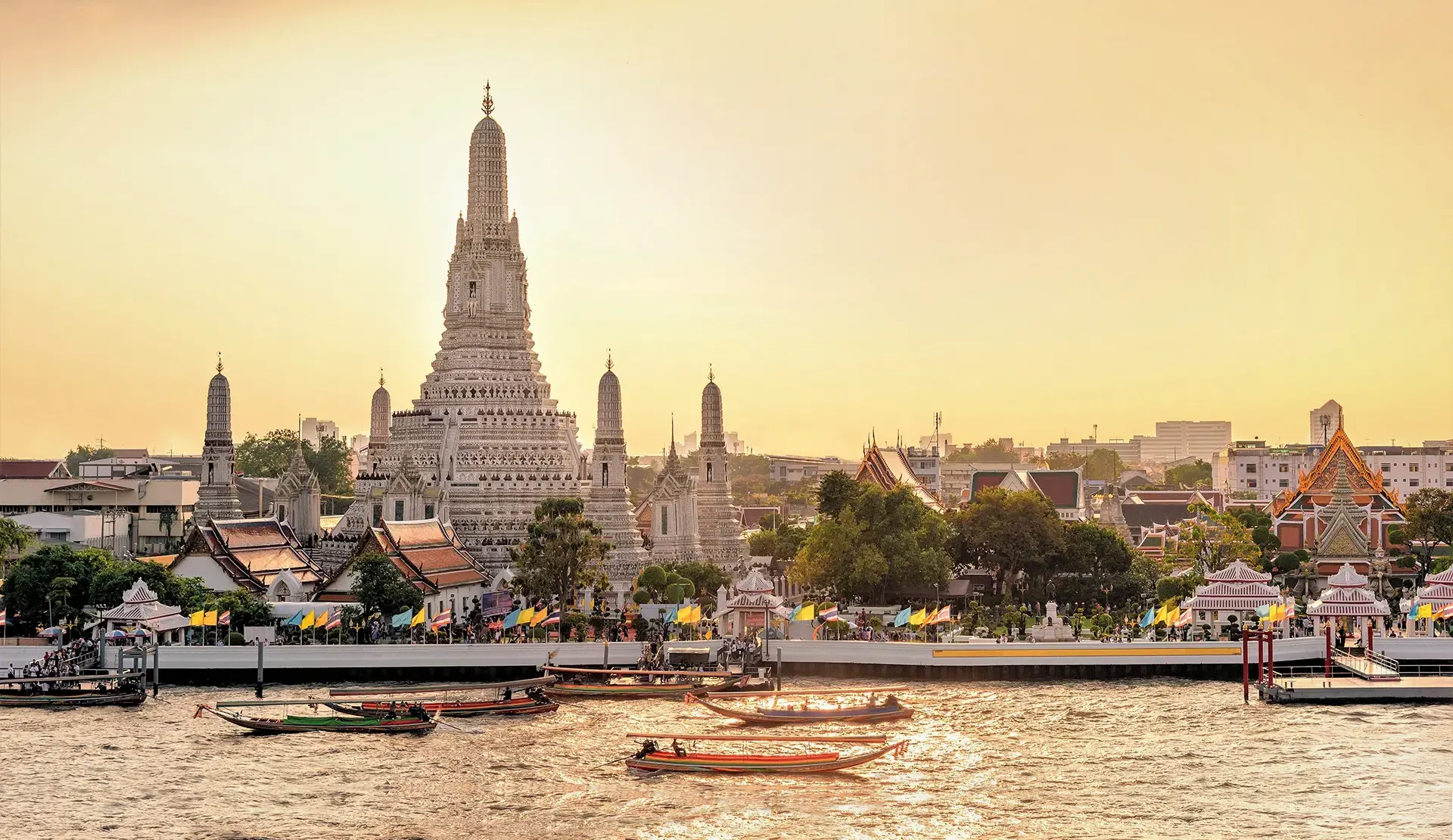
Wat Arun
Wat Arun. You are escorted to your private boat on which you will cross the River of Kings to the spectacular Wat Arun (Temple of the Dawn), which is by far the most striking structure in Bangkok, and is the city’s iconic riverside monument. This is the most unique historic temple structure in Thailand, very different from anything else you will experience, however, as with other Thai places of worship, bare legs and shoulders are not acceptable.
Please do not climb the steps as they are deceptively steep (12 to 15 inches in height) and there is inadequate or nonexistent support for hands. This is Non-Negotiable for anyone who selects to tour with us.
After the temple, you will board your boat again, and cruise back your hotel as dusk settles over Bangkok.
(Overnight – Chatrium Riverside Bangkok)
Day 4: Bangkok – Chiang Mai. (Breakfast) You are assisted with your check-out in the slightly early morning and driven to the airport to board your flight to Chiang Mai, capital of the fascinating Lanna Kingdom. Arrive at Chiang Mai and begin your exploration with the historic walled city, one of the most charming ancient cities in Southeast Asia. This tour demonstrates the architectural diversity and blending of styles that the Lanna people were famous for. It is also a great way to get familiar with the city, should you decide to go out during the evenings to explore on your own.
Lanna Kingdom. The Lanna Kingdom flourished in northern Thailand between the 12th and 15th centuries, and Chiang Mai was the longtime capital of the kingdom after it was moved from Chiang Rai. The city is the second largest city in Thailand, and the cultural capital of the north. Possessing great natural beauty and a host of outdoor activities and parks on its outskirts, the city itself is a fascinating combination of unique architecture, ancient history with its associated rituals, and a modern metropolis. You will visit the 3 most significant ancient monuments in Chiang Mai, all located within the Old City walls.
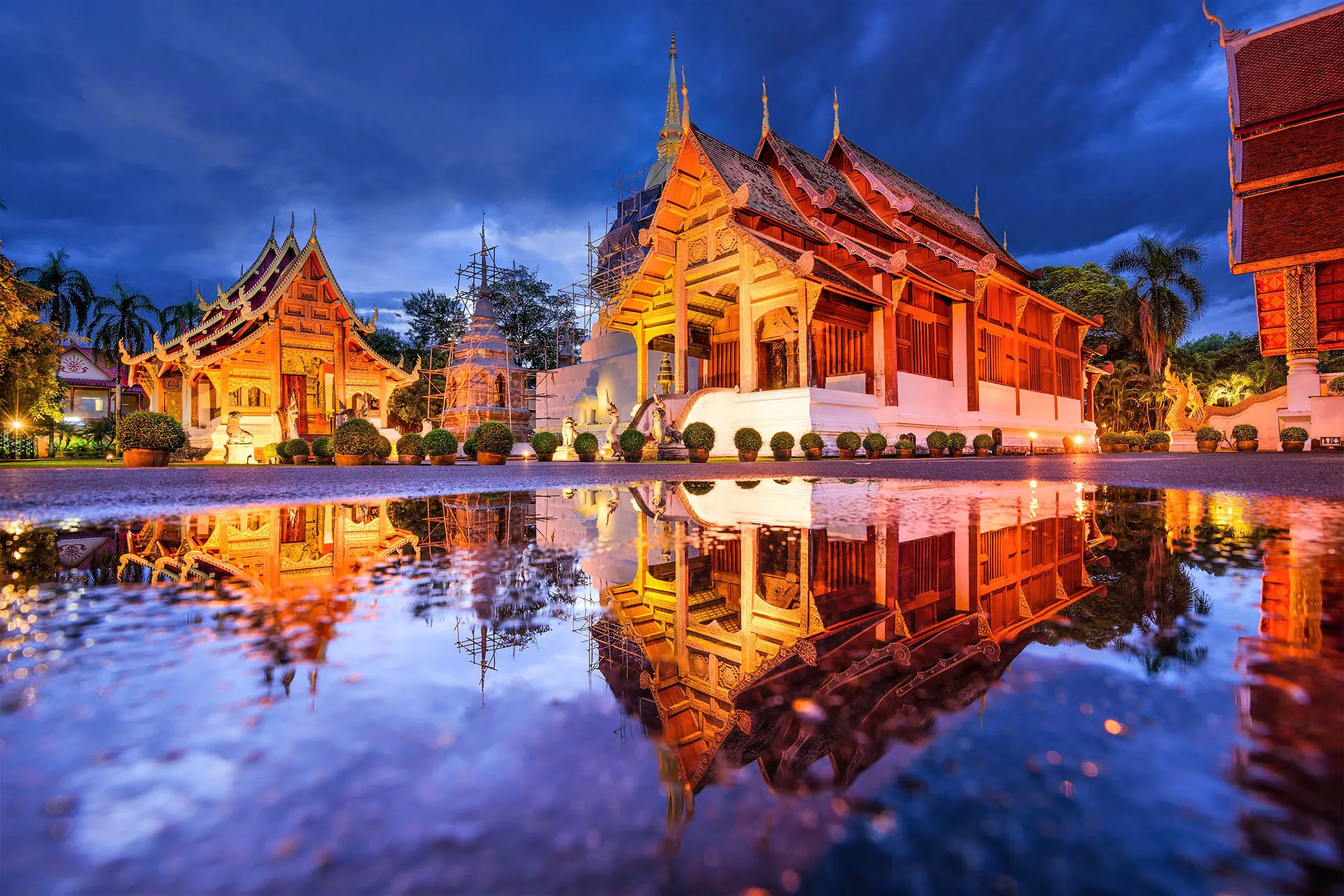
Wat Phra Singh in Chiang Mai
Wat Phra Singh is located within the old city walls of Chiang Mai and is one of the city's most important temples. Established in the 14th century, Wat Phra Singh is renowned for its Lanna-style architecture, intricate wood carvings, and beautiful murals. It houses the Phra Singh Buddha, a highly revered Buddha image, which gives the temple its name. The temple complex includes several buildings of historical and religious significance, making it a center for religious ceremonies and a focal point for Songkran (Thai New Year) festivities in Chiang Mai.
Wat Chedi Luang is famous for its massive chedi (pagoda), which was originally constructed in the 14th century but was partially destroyed by an earthquake in the 16th century. Despite its damage, the chedi remains an impressive structure and is one of the most iconic landmarks of Chiang Mai. Wat Chedi Luang also once housed the Emerald Buddha, Thailand's most sacred Buddha image, now located in Bangkok. The temple serves as a key site for religious ceremonies and is known for its ordination hall built in the traditional Lanna style.
Wat Chiang Man is the oldest temple in Chiang Mai, believed to have been built in the late 13th century by King Mengrai, the founder of Chiang Mai. Wat Chiang Man is known for its ancient chedi supported by rows of elephant figures and houses two important and venerated Buddha images: the Phra Sila (Stone Buddha) and the Phra Satang Man (Crystal Buddha). The temple's architecture reflects the early Lanna style, with intricate wood carvings and stucco work.
Lunch and Check-in. You have many options for lunch, and after lunch you will be assisted with your check-in to your suite at your beautiful boutique riverfront resort. The location is ideal for exploring Chiang Mai, and the facilities and service at are exemplary. The Na Nirand Resort captures the essence of traditional Lanna architecture and combines it seamlessly with modern comforts. The resort’s 100 plus year old Giant Rain Tree makes its riverfront location a haven for guests.
Doi Suthep. In the mid-afternoon you will proceed on the short drive up to Doi Suthep, the hill on the edge of the city that dominates the Chiang Mai skyline. Once at the top, you will find the 309 stairs up to Wat Phra That Doi Suthep, which are flanked on each side by beautiful Nagas running the entire length of the stairs. You also have the option of taking a large elevator (which does usually have a short waiting line) up to the Wat. Once at the top, enjoy the spiritual ambience of one of Thailand’s most holy places, as well as some superb sunset views of the city. You will see devout Thai’s circling the main stupa in a ritualistic manner, and many others on their knees in deep prayer.
Night Market. Join your Country Connoisseur Guide this evening for an excursion to Chiang Mai’s largest night market. It is a fascinating street food scene with its crowds and activity making it another one of Southeast Asia’s amazing photo opportunities.
(Overnight – Na Nirand)
Day 5: Chiang Mai - Doi Inthanon Excursion. (Breakfast)
Doi Inthanon National Park. Head to spectacular Doi Inthanon Mountain, an excursion that includes a visit to the most photographed attraction in Northern Thailand, the Royal Chedis, Phra Mahathat Naphamethanidon and Phra Naphaphonphumisiri. Doi Inthanon National Park is a protected area that is home to the highest mountain in Thailand, Doi Inthanon. This is a full day excursion and you will get back to your resort in the evening.
Views and Nature. Doi Inthanon is a superb national park full of majestic waterfalls, lush green valleys, terraced paddy fields, fruit, flower and vegetables crops, and ethnic communities living comfortably in their natural environment. Once at the peak you will admire the views, and then enjoy an easy trek through the mist laden virgin forest and admire the unique flora that is found here. Depending on water levels, there may be one or two stops at waterfalls.
Royal Project Kitchen. After this adventure you will be driven downhill and lunch will be at the Royal Project Kitchen (with fresh natural and organic ingredients from project farmers), while admiring the beautiful surroundings and views. After lunch there will be two more not-to-be-missed experiences on your way back to Chiang Mai.
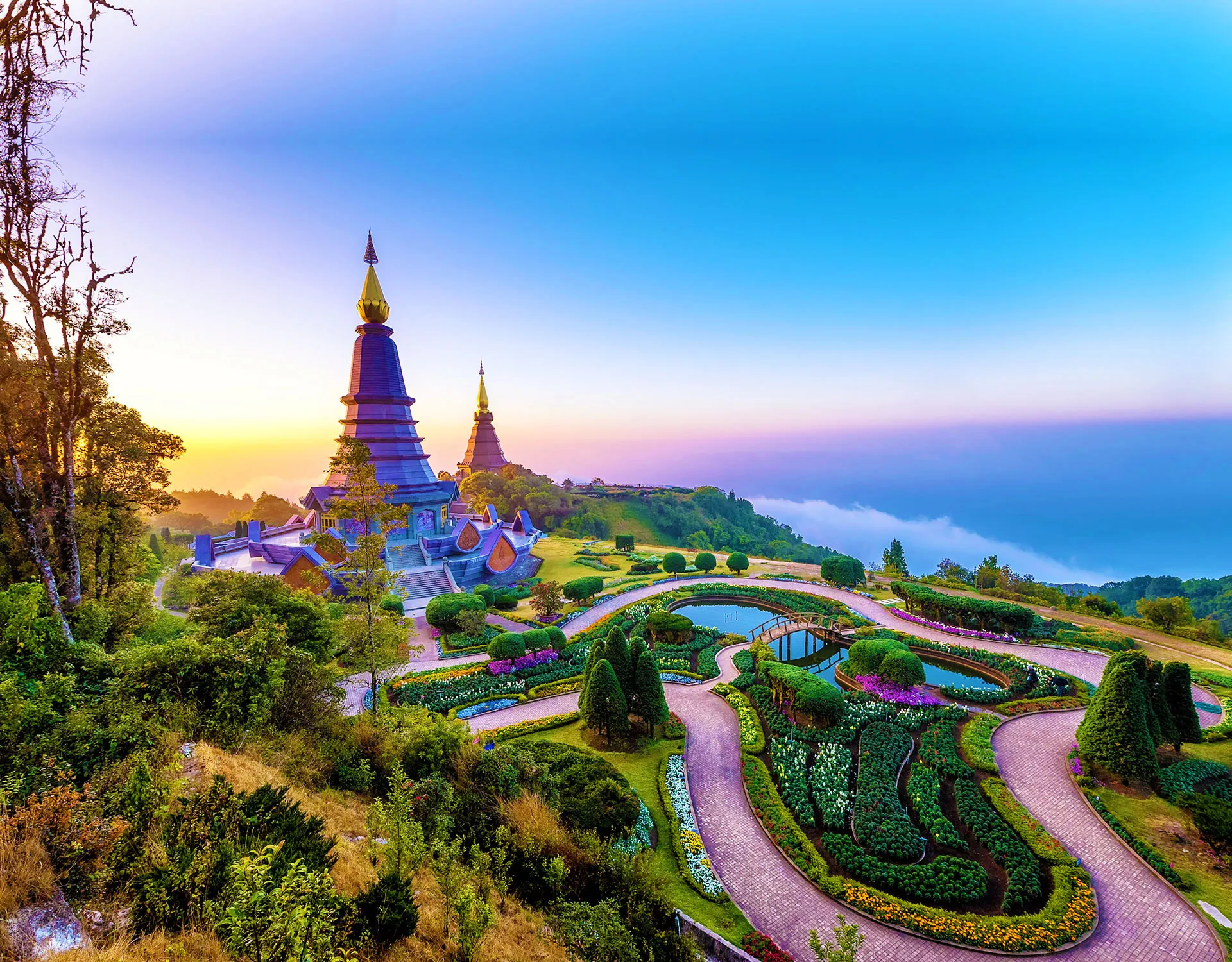
Royal Chedis at Doi Inthanon
Royal Chedis. Next you will stop at the two afore-mentioned spectacular Chedis, which are dedicated to the Beloved Late King and the Revered Queen and are located in a magical spot with lush undulating hills and spectacular views. The immaculate terraced gardens with a plethora of colorful exotic flowerbeds that surround the Chedis make for a breathtaking locale and a fantastic photo opportunity. These massive and gorgeous Chedis are the subject of the most popular photos that travel journals and websites use for the Chiang Mai region, and are not situated in Chiang Mai, but close to the peak of Doi Inthanon.
Hill Tribe Market. Your last stop as you head down the mountain is the Royal Projects Highway Market run by the Hill Tribes of the Doi Inthanon region. You will stop and walk around the outdoor stalls selling fruits, produce, nuts and other items organically grown by the simple and now well-to-do tribal locals, some of whom will be dressed in their unique clothing. This market, its wares, and the tribal people that grow and sell here are a growing testament of the success of the Late King’s vision and efforts. After this you will return to your boutique resort arriving in the evening.
(Overnight – Na Nirand)
Day 6: Chiang Mai – Elephant Park (Breakfast and Lunch)
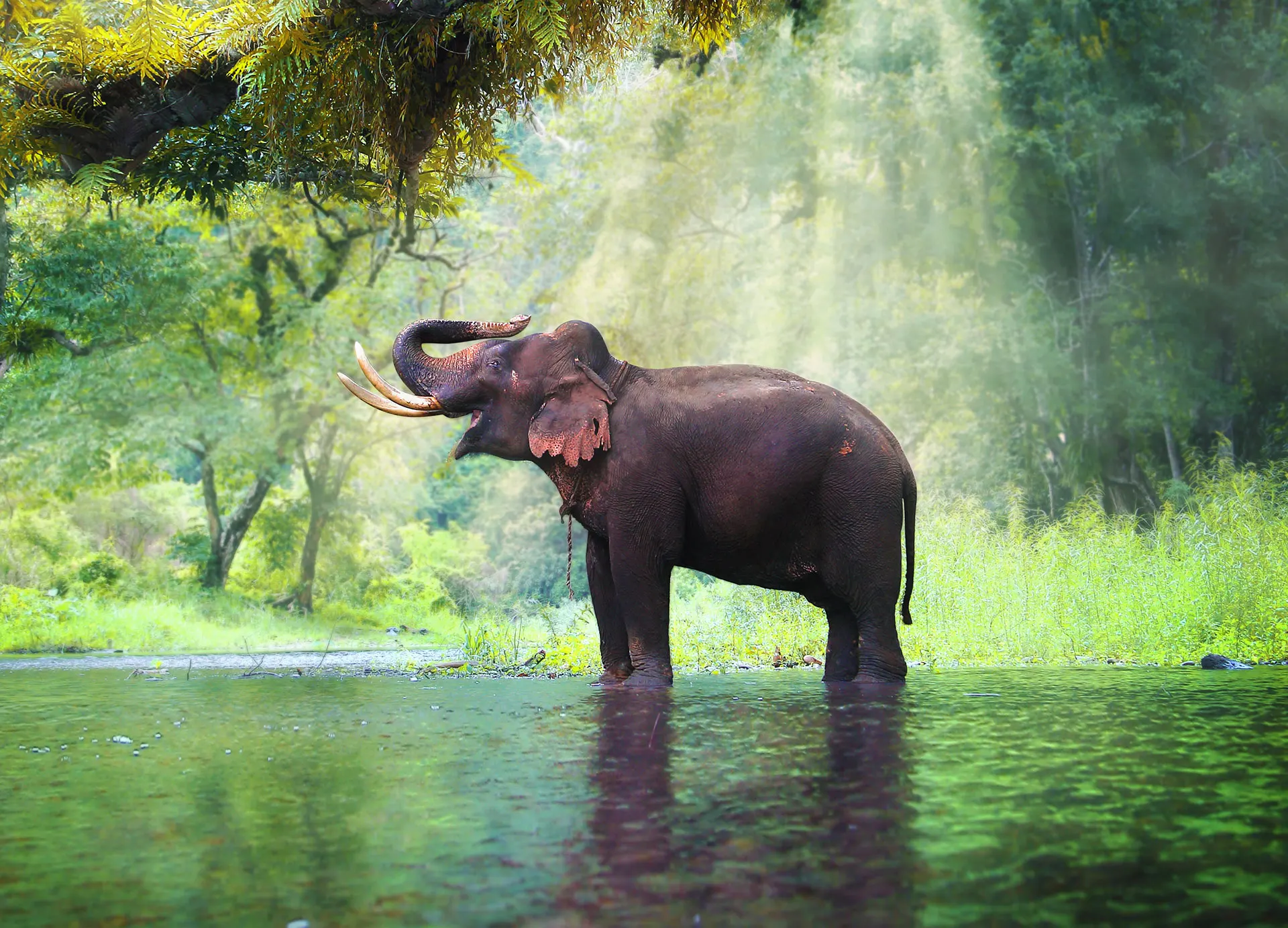
Tusker
Baan Chang Elephant Park (No Elephant Riding). After an early breakfast this morning you will head out with your Thailand Connoisseur Guide and drive out to the mountains to enjoy some time with Thailand’s iconic animal – the elephant. You will be spending the day at one of the finest elephant camps in Northern Thailand and taking part in a hands-on experience that will allow you to truly interact with these majestic animals.
Baan Chang Camp stopped offering Elephant Riding a while back, and even when they did offer that activity, they never used cages for riding. The “Elephant Day Care” is an interactive and personalized program that aims to spread knowledge about elephant conservation efforts while creating a unique and special experience for everyone who joins. The current schedule, as per the camp operator, is as follows:
Arrive at Baan Chang Elephant Park, change into traditional clothing.
Prepare fruits for the elephants and meet the elephants. Feeding, roaming, touching, and playing with elephants.
12:00 pm Lunch
1:00 pm Prepare and cook sticky rice in order to be mixed with herbal stuff for the elephants. Learn about the background, health care and behavior of elephants.
2:00 pm Enjoy more time roaming, feeding and taking the elephants for a walk to a clean water pond where they will cool themselves off and you will have a chance to observe and join them in bathing as well. Feed sticky rice balls and fruits to the elephants. This part is focused on taking your time and allowing the elephants to enjoy each moment of their freedom, scratching, rubbing, and throwing dirt on their backs, an activity that is good for their skin.
** Tea and coffee break.
Visit and play with the baby elephants in the Nursery Zone.
At about 3 PM you will join your Guide and be driven back to your Chiang Mai resort, arriving at about 4 PM.
(Overnight – Na Nirand)
Day 7: Chiang Mai – Chiang Rai. (Breakfast)
Scenic Drive. You are assisted with your checkout in the morning and you will now proceed on the scenic drive to Chiang Rai. As you leave Chiang Mai, the urban landscape quickly gives way to lush greenery and rolling hills. The route passes through a diverse range of terrains, from flat valleys to mountainous areas, providing a refreshing and ever-changing backdrop. You'll encounter stretches of dense forest, agricultural lands, and small villages, offering glimpses into rural Thai life. The road meanders through hills and alongside rivers, And, as you approach Chiang Rai, the terrain becomes flatter, but the rural charm continues.
Lunch and Check-in. You are driven to your riverfront resort, Chiang Rai’s top-ranked upscale lodging. Upon arrival you will enjoy lunch before you are assisted with your check-in. Your large suite has a view of the lush and hilly Chiang Rai region, including the beautiful river than runs right next to your resort. You are at leisure for a short while to freshen-up before heading out in the mid-afternoon. Unlike Bangkok and Chiang Mai, Chiang Rai town itself is backpacking traveler oriented and is not recommended for an excursion. The Peak Wine & Grill at your resort offers spectacular views of the river, mountains, and countryside, with usually wonderful sunsets.
Chiang Rai Town. The mountainous region of the north has been significantly influenced by Burmese and Chinese culture due to its proximity to those nations. The culture, language, and food, even the physical appearance of the local Lanna descendants, all stand in subtle contrast to the rest of Thailand. This is Thailand’s northernmost city and was the first capital of the Lanna Kingdom. Today it is the commercial center of the once infamous Golden Triangle Region. Chiang Rai is tiny compared to Chiang Mai, and this northern outpost has an even slower pace and a markedly laid-back feel. Arriving at Chiang Rai there is a break for lunch.
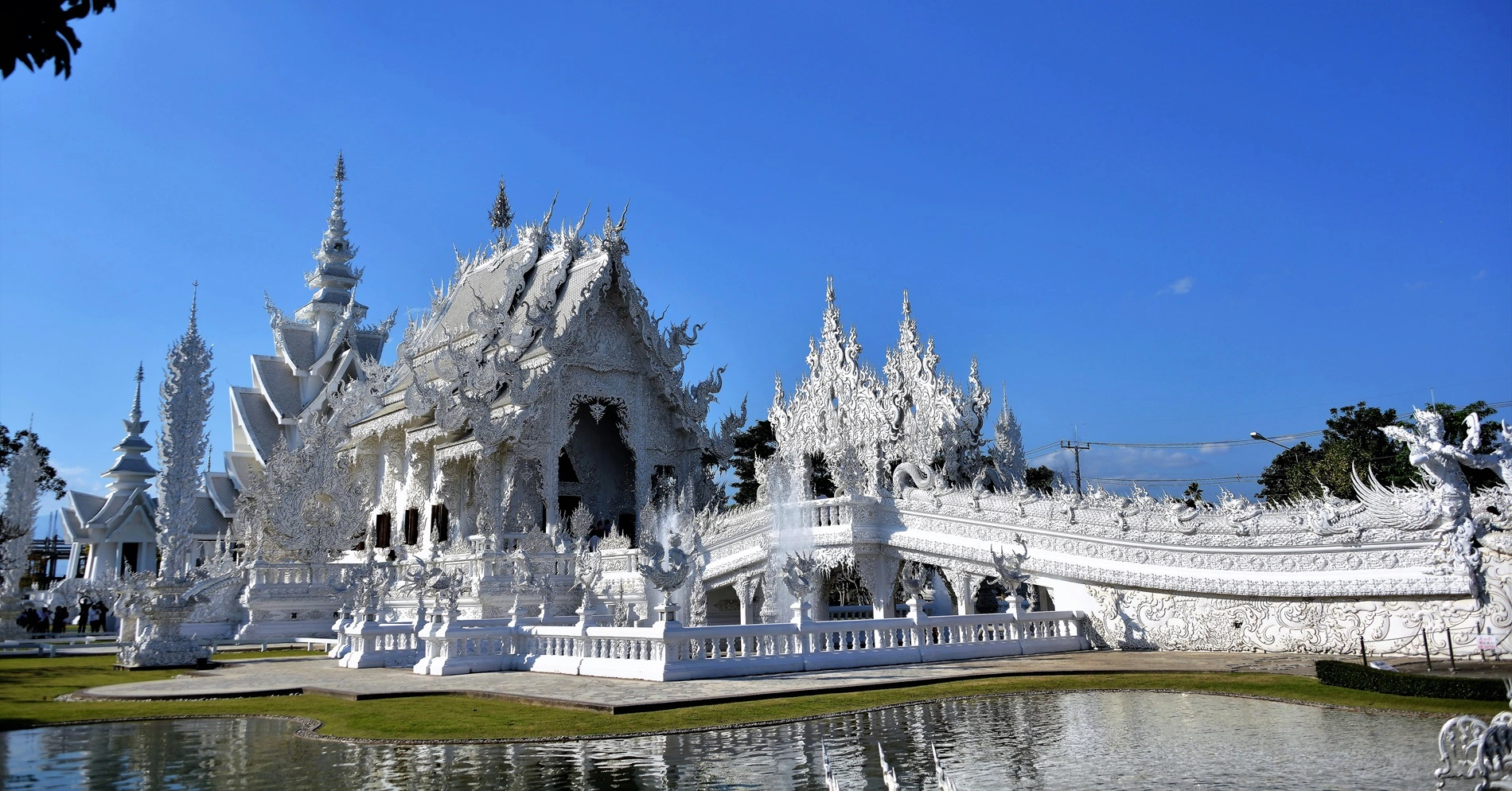
The White Temple
The White Temple. You are driven to a monument that is nothing like anything you have ever seen before, Wat Rong Khun, also known as the White Temple. This recent striking creation of a famous local architect is extremely ornate and beautiful in its design and houses an impressive array of intricate sculptures. This is the attraction that gets the most visitors in the Chiang Rai region and for good reason – it is completely different from any other monument in Southeast Asia.
Wat Phra Kaew. Next you will visit the original Wat Phra Kaew, which was home to the precious Emerald Buddha statue before it was moved to Bangkok. With a known history going back about 700 years, this is one of Northern Thailand’s most revered Buddhist pilgrimage destinations. The beautiful temple complex is housed in gorgeous gardens with orchids and other blooming flora and is far less crowded when compared to Bangkok and Chiang Mai’s main temples. The architecture of the temple, and the quality of the craftsmanship of the statues inside, especially the massive 7 century old brass and copper statue of Lord Buddha in the main chapel, is outstanding.
(Overnight – The Riverie by Kathathani)
Day 8: Chiang Rai. (Breakfast)
Ancient Chiang Saen. Continue your exploration of Northern Thailand with a drive to the ancient region of Chiang Saen. Located along the banks of the Mekong River, the once great city was the capital of a Kingdom during the 12th and early 13th centuries. Now all that remains is a sleepy riverside town with some well-preserved remnants amongst beautiful teak and banyan trees.
Three Country River Cruise. At Sop Ruak you will be assisted in boarding your boat for a cruise along the upper Mekong River to the exact coordinates of the Golden Triangle. Cruise the mighty river where the countries of Thailand, Laos, and Burma meet and you will view the lush countryside of each nation as you cruise. This spectacular region was once the infamous location for the production of most of the world’s opium.
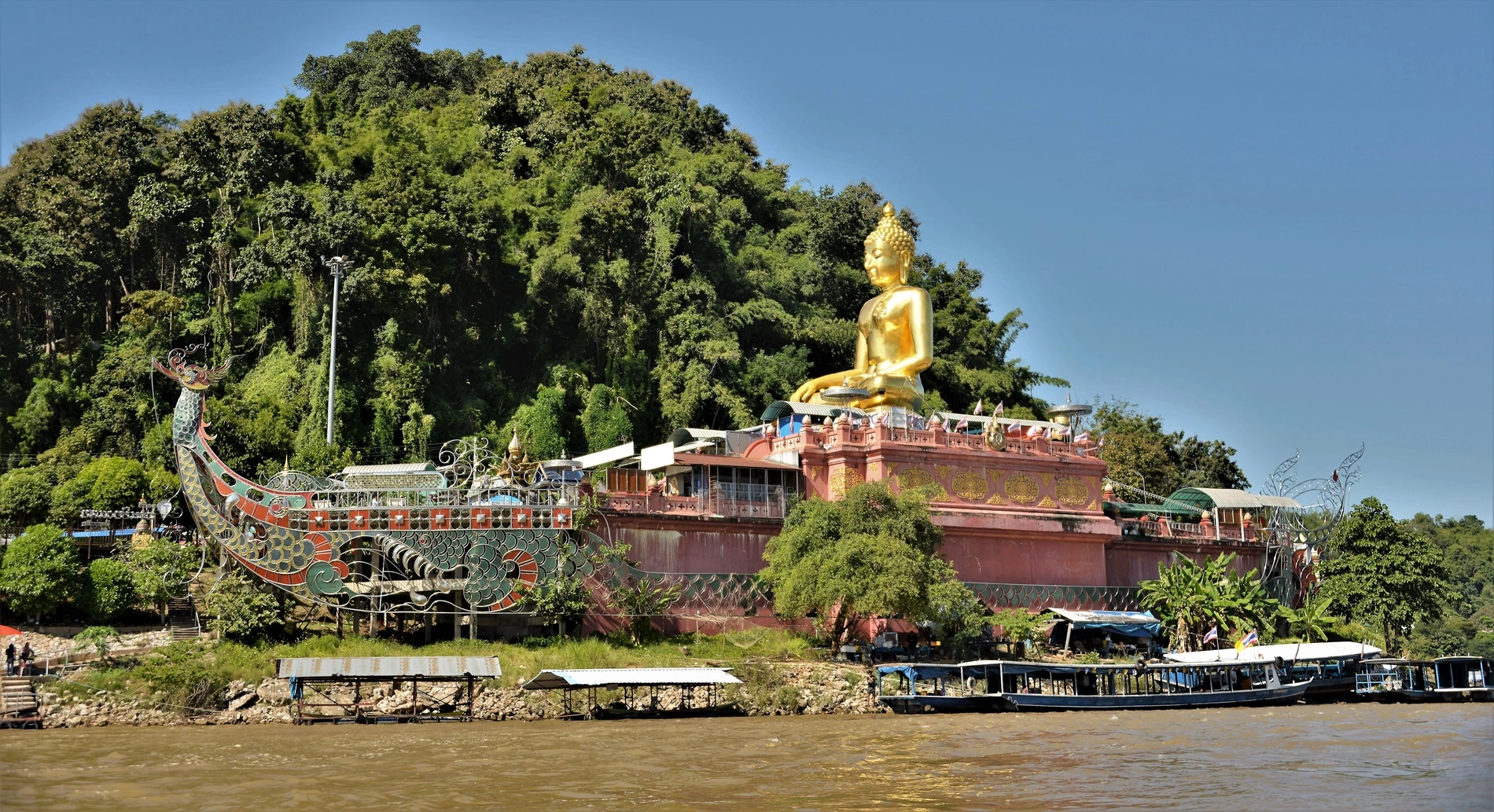
Buddha Statue at Golden Triangle
Hilltop Three Country View. Disembark from the boat and you are driven to a hilltop viewing site where you can clearly see the spot where the three nations meet at the confluence of two rivers. You will break for lunch at the only upscale restaurant in this area and after lunch you will proceed for a scenic drive to the hills near Chiang Rai.
Hill Tribes. Many travel companies continue to paint a picture of the unique traditional clothing, jewelry and lifestyles of Southeast Asia’s hill tribes as if these have remained unchanged over the last few decades. The truth is quite the opposite. The hill tribes were an integral part of poppy farming for a long time, and supported themselves and their unique lifestyles through its cultivation.
Leaving Poppy. About six decades ago the revered late King of Thailand mostly ended the drug cultivation and trade and made significant efforts to uplift and empower the tribal people. His goal was to provide them with alternative livelihoods and education for their children so that they could assimilate into the rest of Thailand’s population. Although some still live in their villages and farm, their lifestyles have changed; they dress like other Thai people do, practice modern cultivation methods, live in brick and mortar houses, speak the Thai dialect that is local to their region, ride motorbikes and drive pickup trucks as part of their daily routine.
Hill Tribe Tourism. There are a handful of locales where the tribal communities have been somewhat preserved in their original form with support from government funded agencies. The agencies’ goal is to provide the few who do not want to change a place to live, while also making them self-sufficient. Easy Tours guests visit one of the better such villages, located near Chiang Rai.
Tribal Village.During this excursion, you will pay a visit to the Kiran (longneck), Akka, Lahu, and Yao tribes. Your Tour Director will introduce you to some of the villagers and explain the origins and customs of these unique tribal peoples. These villagers still honor their heritage by dressing in the vibrant and colorful garments unique to their people. The entry fees to this set of villages supports the hill tribe residents of the village, and the tribal residents also offer hand crafted items for sale, although they are not the least bit aggressive in pushing their wares. You are driven back to your resort in Chiang Rai after walking through the villages.
(Overnight – The Riverie by Kathathani)
Day 9: Flight to Bangkok, Connect to Your International Flight.
You are assisted with your check-out by noon and driven to the Chiang Rai airport and assisted in boarding your flight (timing will depend on your international departure) to Bangkok Airport, where you will connect with your international flight. Additional Services such as lodging at Bangkok Airport, and/or transfers, can be arranged with your U.S. based Guest Care Specialist after tour reservation.
Our Services End at Bangkok Airport.
Lodging
| City | Hotel | Room Type |
| Bangkok |
Chatrium Riverside Bangkok
|
Grand Deluxe River View
|
| Chiang Mai |
Na Nirand
|
Romantic Lanna Deluxe Room
|
| Chiang Rai |
The Riverie by Kathathani
|
Deluxe River View
|
Inclusions ▼
| The Best Local Guides at each destination |
| Breakfast daily except for Arrival Day |
| Ground transportation via upscale vehicles |
| Representative for assistance on departure / arrival transfers per the itinerary |
| Applicable monument entrance fees as per the itinerary |
| Bottled water during sightseeing |
| Hotel accommodation as listed above |
| All Boat Fees/Fares per the itinerary |
Exclusions ▼
| International travel except countries on your Easy Tours Journey |
| Any expenses of a personal nature, such as tips, laundry, phone calls, drinks etc. |
| Meals other than those specified on itinerary |
| Travel insurance, visas, etc. |
Our Lowest Pricing
| Lodging | Land Cost - Dbl Occupancy | On Tour Flights | Total Cost |
| Upscale (As Shown in Itinerary) |
$3,500 PP | $250* PP | $3,750 / per person |
| Luxury View Hotels |
$4,590 PP | $250* PP | $4,840 / per person |
| Opulent View Hotels |
$7,740 PP | $250* PP | $7,990 / per person |
Annual Sale. Aug 16th to Aug 30th
Save 10% On All Our Tours
Subject to Availability of our Preferred Guides & Lodging for Your Dates
Ask Questions Or Send Us Your Dates
Please wait while we are processing your request...




